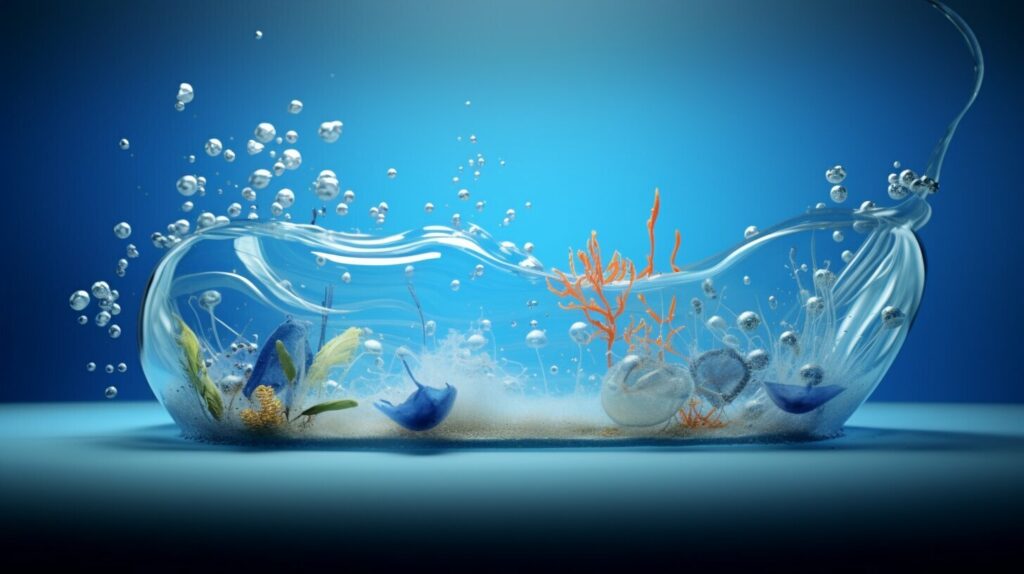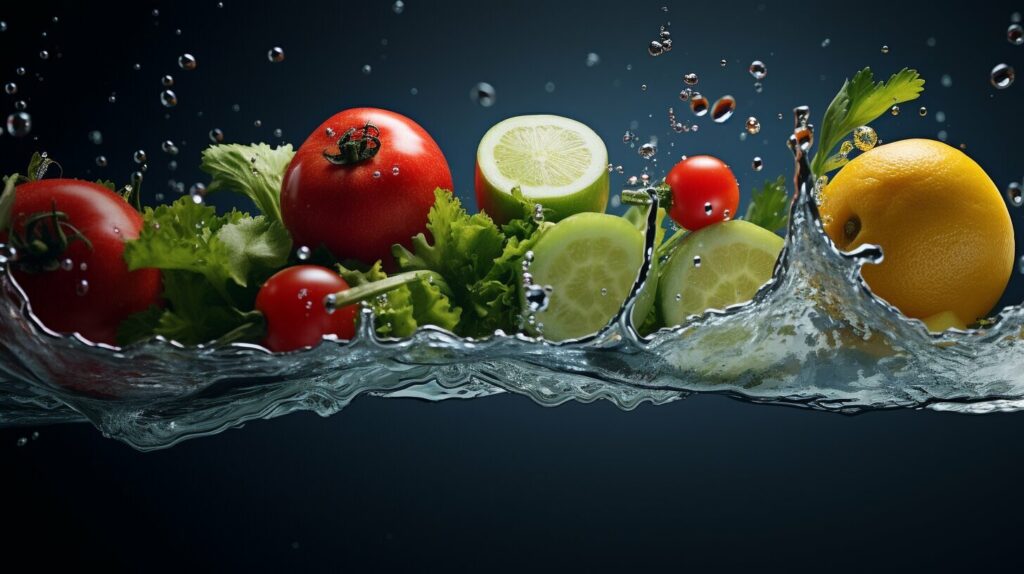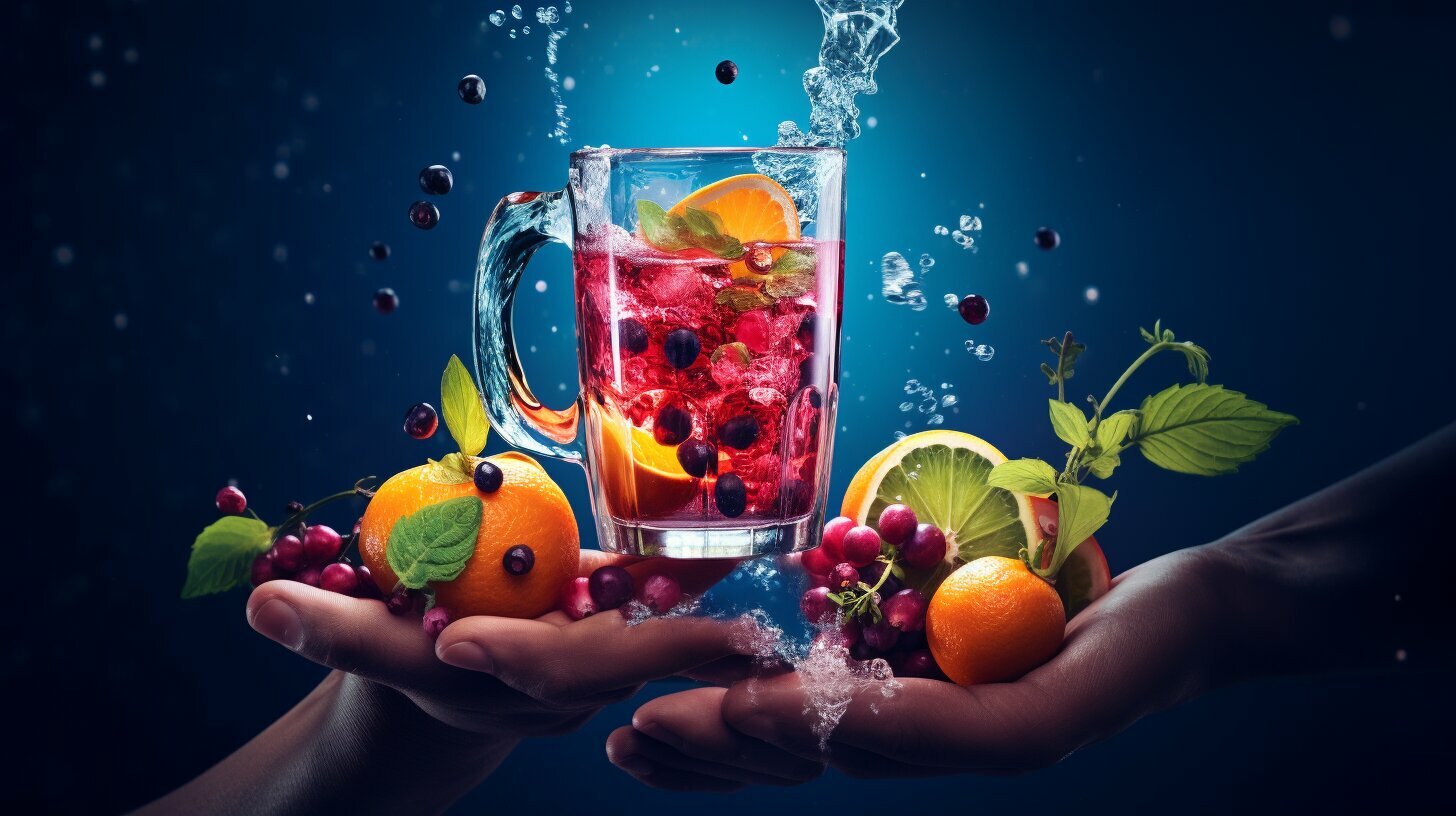Water is not just essential for survival, but it also plays a crucial role in maintaining a healthy diet and achieving weight loss goals. Our bodies are made up of more than two-thirds water, and this vital substance serves multiple functions to keep us functioning optimally.
When it comes to diet and weight loss, the benefits of drinking water cannot be overstated. Hydration is key to regulating body temperature, lubricating joints, and aiding in digestion. It is also essential for detoxification processes, ensuring that waste is effectively eliminated from the body.
Dehydration can have serious consequences, ranging from fatigue and headaches to impaired cognitive function and even life-threatening conditions. To stay properly hydrated, it is recommended that adults consume between 91 and 125 fluid ounces of water each day. However, individual needs may vary based on factors such as weight, age, and activity level.
Thirst alone is not always a reliable indicator of hydration. It is important to drink fluids regularly throughout the day, even if you don’t feel thirsty. In order to promote better overall health, choosing water over sweetened beverages is highly recommended to avoid excess calorie intake.
As we age, our body’s thirst signals may change, making it even more crucial to stay mindful of fluid intake. If you have any concerns, it is always a good idea to consult a doctor to ensure you are meeting your specific hydration needs.
Key Takeaways:
- Water is essential for maintaining a healthy diet and achieving weight loss.
- Drinking enough water is crucial for regulating body temperature, lubricating joints, aiding digestion, and detoxification.
- Dehydration can have serious consequences, so it’s important to consume an adequate amount of water each day.
- Individual water needs vary based on factors like weight, age, and activity level.
- Thirst alone is not always a reliable indicator of hydration, so drink fluids regularly throughout the day.
The Importance of Hydration in a Healthy Diet
Hydration is key to maintaining good health and nutrition, as water is involved in numerous bodily functions that support our overall well-being. From regulating body temperature to aiding in digestion, water plays a crucial role in our everyday lives.
Did you know that water makes up more than two-thirds of our body weight? It acts as a lubricant, helping to cushion and protect our joints and organs. Water also helps transport nutrients and oxygen throughout the body, ensuring that our cells receive the necessary fuel they need to function properly.
Staying hydrated is especially important for our digestive health. Water aids in the breakdown of food, allowing our bodies to absorb nutrients more efficiently. It also helps prevent constipation by keeping our stools soft and easy to pass. So, if you want to support a healthy digestive system, make sure to drink an adequate amount of water each day.

Stay Hydrated to Feel Your Best
Proper hydration is not only important for physical health but also for mental and emotional well-being. When we are dehydrated, we may experience symptoms such as fatigue, dizziness, and difficulty concentrating. By staying hydrated, we can improve our energy levels, boost cognitive function, and enhance our overall mood.
So, how much water should you be drinking? The Dietary Reference Intake for water recommends between 91 and 125 fluid ounces per day for adults. However, individual needs may vary depending on factors such as weight, age, and activity level. Remember, thirst is not always a reliable indicator of hydration, so it’s important to drink fluids regularly throughout the day to ensure you are meeting your body’s needs.
Choosing water over sweetened beverages is also important for maintaining a healthy diet. Sugary drinks can contribute to excess calorie intake and may have negative effects on our overall health. Opting for water, on the other hand, provides hydration without unnecessary added sugars or artificial ingredients.
| Benefits of Staying Hydrated | How to Stay Hydrated |
|---|---|
|
|
“Water is the driving force of all nature.” – Leonardo da Vinci
As we age, our thirst may change, making it even more important to stay mindful of our fluid intake. If you have any concerns about hydration or notice signs of dehydration, such as dark urine or excessive thirst, it’s always a good idea to consult a doctor.
Remember, water is essential for our bodies to function properly. By prioritizing hydration and incorporating enough water into our daily lives, we can support our overall health and well-being.
Water and Digestion: A Closer Look
Water plays a vital role in the efficient digestion of food and the removal of waste products, making it an essential component of a healthy diet. When we consume food, water helps break it down into smaller particles, making it easier for our bodies to absorb the nutrients. It also helps lubricate the digestive tract, allowing food to move smoothly through the system.
Additionally, water aids in the process of detoxification by flushing out toxins and waste products from our bodies. It helps maintain the proper balance of fluids, ensuring that our digestive system functions optimally. Without enough water, digestion can be compromised, leading to issues such as constipation and indigestion.
Research suggests that staying hydrated can help prevent digestive problems and improve overall gut health. Drinking an adequate amount of water throughout the day can help regulate bowel movements, reduce bloating, and promote healthy digestion. It is important to note that while water is essential for digestion, it is best to avoid consuming excessive amounts during meals as it may dilute stomach acids and hinder the digestion process.
| Benefits of Water for Digestion: |
|---|
| • Helps break down food particles for better absorption of nutrients |
| • Lubricates the digestive tract, aiding in smooth movement of food |
| • Assists in the detoxification process, flushing out toxins |
| • Maintains fluid balance, ensuring optimal digestive function |
In summary, water is not only essential for staying hydrated, but it also plays a crucial role in digestion and detoxification. By drinking an adequate amount of water daily and incorporating it into a healthy diet, we can support our digestive system and promote overall well-being.

Water and Weight Loss: How They Connect
Water can be a valuable tool in your weight loss journey, as it helps to boost metabolism, curb cravings, and promote feelings of fullness. When it comes to shedding those extra pounds, staying hydrated is crucial. Drinking an adequate amount of water throughout the day can have a significant impact on your weight loss efforts.
One of the ways water aids in weight loss is by boosting metabolism. Research has shown that drinking water can temporarily increase the number of calories your body burns. This is known as the thermic effect of water, where your body uses energy to warm up the water to your body’s temperature. By staying hydrated, you can give your metabolism a little extra boost.
Another way water supports weight loss is by curbing cravings. Often, when we feel hungry, it’s actually our body’s way of signaling thirst. By drinking water, you can help differentiate between true hunger and thirst. Additionally, water can help you feel fuller, reducing the urge to snack or overeat. Before reaching for a snack, try drinking a glass of water and see if the cravings subside.
Incorporating more water into your diet is relatively simple. Start by replacing sugary beverages like soda and juice with water. Not only will this save you empty calories, but it will also keep you hydrated. If you struggle to drink plain water, try infusing it with fruits or herbs for added flavor. Remember to keep a water bottle with you throughout the day as a reminder to stay hydrated.
| Benefits of Water for Weight Loss: |
|---|
| Boosts metabolism |
| Curbs cravings |
| Promotes feelings of fullness |
Remember, everyone’s hydration needs may vary, so it’s important to listen to your body and drink enough water to stay properly hydrated. While the Dietary Reference Intake for water is between 91 and 125 fluid ounces per day for adults, individual factors such as weight, age, and activity level can influence your specific needs. Thirst is not always a reliable indicator of hydration, so aim to drink fluids regularly throughout the day to maintain optimal hydration levels.

Stay Hydrated, Stay Healthy
Water is a powerful ally in your weight loss journey. By drinking enough water, you can boost your metabolism, curb cravings, and promote feelings of fullness. Remember to choose water over sugary beverages and listen to your body’s hydration needs. Stay hydrated, stay healthy!
Recommended Daily Water Intake
Understanding how much water you should be drinking each day is essential to maintain optimal health and ensure proper hydration. Water is a fundamental component of our bodies, accounting for more than two-thirds of our total weight. It plays a crucial role in various bodily functions, including lubricating joints, regulating body temperature, and aiding in the digestion and absorption of nutrients. Dehydration, which occurs when we lose more water than we consume, can have serious consequences, affecting our physical and cognitive performance, as well as our overall well-being.
According to the Dietary Reference Intake for water, the recommended daily intake varies for adults. For women, it is typically around 91 fluid ounces (2.7 liters), while men are advised to consume about 125 fluid ounces (3.7 liters) of water per day. However, it’s important to note that individual water needs may differ based on factors such as weight, age, activity level, and external conditions like hot weather or intense physical activity.
Thirst is not always an accurate indicator of our hydration status, so it’s crucial to make a conscious effort to drink fluids regularly throughout the day. By keeping a water bottle handy and sipping on water consistently, we can ensure that our bodies remain adequately hydrated. It’s also worth mentioning that while water is the preferred beverage for hydration, other fluids like herbal tea and low-sugar juices can contribute to our overall water intake as well.
| Factors | Recommended Daily Water Intake |
|---|---|
| Age | Varies for different age groups |
| Weight | Individual needs may vary |
| Activity Level | Higher activity levels may require increased water intake |

In conclusion, it is essential to prioritize hydration and ensure that we consume an adequate amount of water each day. The recommended daily water intake, as outlined by the Dietary Reference Intake, serves as a general guideline, but individual needs may vary. By staying mindful of our fluid intake, regularly sipping on water, and choosing water over sugary beverages, we can maintain optimal health and support our bodies’ vital functions.
Signs of Dehydration: When to Pay Attention
Recognizing the signs of dehydration is crucial for maintaining good health, as untreated dehydration can lead to serious complications. Water is essential for the body, making up more than two-thirds of its weight. It serves multiple functions, including lubricating the body, regulating temperature, and aiding in digestion. Without adequate hydration, these processes can be disrupted, impacting overall well-being.
So, how do you know if you’re dehydrated? The signs can vary, but some common symptoms include:
- Increased thirst
- Dry mouth and lips
- Dark yellow urine
- Headaches or dizziness
- Fatigue or low energy
If you experience any of these signs, it’s important to take action and replenish your fluids. Drinking water is the best way to hydrate, but you can also consume fruits and vegetables with high water content, such as watermelon or cucumbers.
Remember, prevention is key. By regularly drinking fluids throughout the day, you can help prevent dehydration and ensure your body has the water it needs to function optimally.

| Signs of Dehydration | Actions to Take |
|---|---|
| Increased thirst | Drink water or fluids with electrolytes |
| Dry mouth and lips | Sip water or suck on ice chips |
| Dark yellow urine | Rehydrate with water or sports drinks |
| Headaches or dizziness | Rest in a cool place and drink water |
| Fatigue or low energy | Replenish fluids and rest |
If you find yourself experiencing severe symptoms of dehydration, such as confusion, rapid heartbeat, or fainting, seek medical attention immediately. These could be indications of severe dehydration or other underlying medical conditions that require professional treatment.
Stay hydrated and listen to your body. By recognizing the signs of dehydration and taking the necessary steps to rehydrate, you can support your overall health and well-being.
Water vs. Sweetened Beverages: Making the Right Choice
Making the conscious choice to opt for water over sugary beverages can have a significant impact on your diet and overall well-being. Water is essential for the body, making up more than two-thirds of its weight. It not only serves to quench thirst but also plays a vital role in various bodily functions. It helps to lubricate joints, regulate body temperature, and facilitate digestion, among other important tasks. With all these benefits, it’s no wonder that staying hydrated is crucial for our health.
When it comes to hydration, choosing water as your primary beverage is highly recommended. Unlike sweetened beverages, water is calorie-free, making it an excellent choice for those looking to manage their weight. By opting for water instead of sugary drinks like soda, fruit juices, or energy drinks, you can avoid unnecessary calorie intake and reduce the risk of weight gain.
Not only does choosing water help to cut down on excess calories, but it also prevents the harmful effects of added sugars in sweetened beverages. Consuming too much sugar has been linked to various health issues, such as obesity, type 2 diabetes, and heart disease. By replacing these sugary drinks with water, you are making a conscious effort to prioritize your health and well-being.

In conclusion, making the decision to choose water over sweetened beverages is a simple yet powerful step towards a healthier lifestyle. Water provides essential hydration without the added sugars and calories found in many other drinks. By prioritizing water consumption and staying mindful of our fluid intake, we can support our overall well-being and make positive changes in our diet. Remember, every sip of water counts towards better health!
Age and Thirst: Fluid Intake Considerations
As we age, our thirst mechanisms may change, necessitating a deeper understanding of our fluid intake needs and when it’s crucial to consult a healthcare professional. Water is essential for our bodies, accounting for more than two-thirds of our weight. It plays a vital role in various bodily functions, including lubricating joints, regulating body temperature, and aiding in digestion. However, as we grow older, our ability to sense thirst may diminish, making it important to stay mindful of our fluid intake.
Dehydration can occur more easily in older adults and can have severe consequences on their health. Common signs of dehydration in seniors include dry mouth, dark urine, fatigue, dizziness, and confusion. To stay properly hydrated, it is recommended to drink fluids regularly throughout the day, even if thirst is not felt. Water is the best choice as it has no added sugars or calories, making it an optimal beverage for maintaining overall health.
If you are an older adult concerned about your fluid consumption or if you have any underlying health conditions, it is essential to consult a doctor or healthcare professional. They can provide personalized guidance on your hydration needs based on factors such as your medical history, medications you may be taking, and any specific challenges you may face. By seeking professional advice, you can ensure that you are meeting your body’s fluid requirements and maintaining optimal health.
Fluid Intake Guidelines for Older Adults
While specific fluid intake needs may vary depending on individual circumstances, general guidelines recommend drinking between 91 and 125 fluid ounces (2.7 to 3.7 liters) of water per day for adults. It is important to note that this includes fluids from all sources, including beverages and foods with high water content, such as fruits and vegetables.
| Age Group | Recommended Daily Fluid Intake (ounces) | Recommended Daily Fluid Intake (liters) |
|---|---|---|
| 65-79 years | 91-125 | 2.7-3.7 |
| 80 years and older | 91-125 | 2.7-3.7 |
It is important to remember that these are general recommendations, and individual needs may vary. Factors such as overall health, physical activity level, and climate can influence fluid requirements. Consulting with a healthcare professional can provide personalized guidance tailored to your specific needs.

Conclusion
In conclusion, water and diet are intricately linked, with proper hydration playing a vital role in maintaining a healthy lifestyle and achieving weight loss goals. Water is essential for the body, making up more than two-thirds of its weight. It serves multiple functions, including lubricating the body, regulating temperature, and aiding in digestion.
Dehydration can be life-threatening, so it is important to consume enough water each day. The Dietary Reference Intake for water is between 91 and 125 fluid ounces per day for adults, but individual needs may vary depending on factors such as weight, age, and activity level. Thirst is not always a reliable indicator of hydration, so it’s important to drink fluids regularly throughout the day.
Choosing water over sweetened beverages is recommended to avoid excess calorie intake and promote better overall health. As people age, their thirst may change, so it’s important to stay mindful of fluid intake and consult a doctor if concerned. By prioritizing hydration and incorporating water into a well-balanced diet, individuals can optimize their health and well-being.
FAQ
How much water should I drink each day?
The Dietary Reference Intake for water is between 91 and 125 fluid ounces per day for adults. However, individual needs may vary depending on factors such as weight, age, and activity level.
Is thirst a reliable indicator of hydration?
Thirst is not always a reliable indicator of hydration. It’s important to drink fluids regularly throughout the day, even if you don’t feel thirsty.
Why is it important to choose water over sweetened beverages?
Choosing water over sweetened beverages is recommended to avoid excess calorie intake and promote better overall health.
What are the signs of dehydration?
Signs of dehydration include increased thirst, dry mouth, dark-colored urine, fatigue, dizziness, and headache. It’s crucial to pay attention to these signs and ensure adequate fluid intake.
How does water contribute to weight loss?
Water can support weight loss by promoting a feeling of fullness, increasing metabolism, and aiding in the breakdown and removal of fat cells.
How does water affect digestion and detoxification?
Water plays a crucial role in digestion by helping to break down food, absorb nutrients, and move waste through the digestive system. It also aids in detoxification by flushing out toxins from the body.
Should I consult a doctor about my fluid intake as I age?
As people age, their thirst may change. It’s important to stay mindful of fluid intake and consult a doctor if you have concerns or notice any significant changes in your hydration needs.




